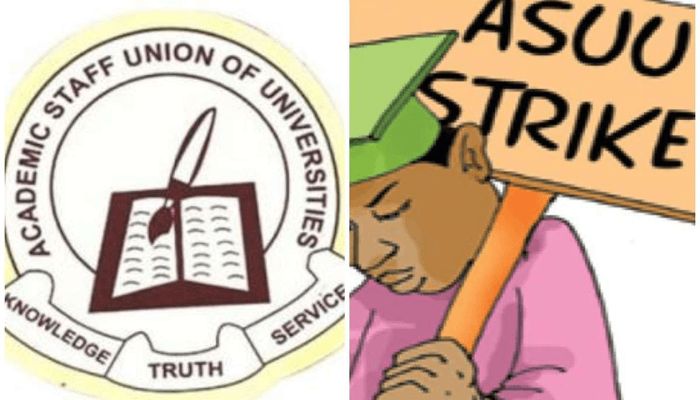How our future is being toyed with by incessant ASUU-FG feud – Students
For countless Nigerian university students, academic life has become a cycle of uncertainty, frustration, and lost time, as many students of the federal government-owned universities are counting the cost of incessant strikes.
The repeated clashes between the Academic Staff Union of Universities (ASUU) and the federal government have left many students stranded, delaying graduations, disrupting career plans, and causing emotional and financial strain, not only on the students but also on their parents and guardians.
Some of the affected students who spoke with BusinessDay opened up on how the prolonged impasse has derailed their lives and hopes for the future.
They are lamenting that they have already spent more years than they were supposed to spend in their courses.
They expressed fears that the ongoing strike could also linger and may also impact negatively on their future. The National Association of Nigerian Students (NANS) said it had given the FG and ASUU a seven-day ultimatum to resolve the impasse.
Read also: ASUU strike: Senate wades in, meet education minister, NUC Tuesday
Khadija Hassan, a 200-level student of Public Administration at the University of Maiduguri, told BusinessDay that the strike has really affected her academically and emotionally.
“I was gearing to write my last paper a day before the strike started, but now everything is on hold again; imagine spending weeks preparing, reading, stressing over examinations, only for ASUU officials to burst into the exam-hall and collect your exam papers before you could even start answering the exam question,” she lamented.
Hassan emphasised that the ongoing loggerhead between ASUU and the federal government has put students in the middle of a conflict they did not create.
“Imagine working hard all semester, preparing for examination and then everything stops because two powerful bodies cannot reach an agreement.
“Every time academic activities are suspended like this, especially when it takes longer days, courses are made to take longer years through the disruptions, this reoccurring disruption also delays graduation and NYSC service, our plans; making us feel stuck while our peers in other institutions move ahead,” she said.
Read also: ASUU strike: UNIBEN, UNN exams disrupted, postponed
Furthermore, she said that for parents, the pain is equally heavy, stressing that many of them make sacrifices to pay their children fees, rents and upkeeps, only to watch as such students are sent back to stay idle at home for months.
“The constant back and forth between ASUU and government makes parents lose faith in public education system and feel helpless about their children’s future. In the end, both students and parents are the real victims of this impasse,” she noted.
Fatimah Oseni, a 300-level student of Business Administration and Entrepreneurship, also lamented the negative impact of the loggerheads between the federal government and ASUU.
Oseni said that the insistent strike has affected her academic calendar resulting graduation delay.
“It’s very frustrating, and students are getting demotivated over this recurring strike, because it causes a lot of setback in their academic pursuits,” she said.
Alarape Kazeem, a post-graduate student of Budgeting and Public Financial Management, described ASUU’s strike as devastating.
“The strike has affected me in many ways; one of which is that it has affected our lectures and research activities, and it’s very frustrating,” he said.
Jibola Oguns, a 200-level student at the University of Ibadan, said he was supposed to be writing his first semester test but for the strike which made the lecturers to suspend all academic activities.
He decried the negative effects of the loggerheads between ASUU and the government which he said has cost them their lecture hours; hence many are idle on campus.
“It’s frustrating. I’m here eating and spending my allowance on campus without getting any lectures to commensurate with the financial implications,” he stressed.
Read also: ASUU again? No; it’s the government!
Ada Nnadi, who just graduated from Mass Communication department of one of the federal universities, said ASUU strikes and the university’s insensitivity kept her set in school for over two years extra.
“I got admission in 2019, and am just leaving school. My classmates in secondary school who got admission into other universities have since finished their National Youth Service programme. Some are already working or have proceeded for their Master’s. I am saying that apart from the ASUU strikes, some universities are not just helping matters at all. I can tell you today that some students in the university are nearly depressed. Many are contemplating dropping out. The system is really frustrating. No wonder many families these days sacrifice everything to send their children to private universities,” Nnadi said.
Stakeholders believe that the persistent ASUU–FG impasse tends to increase dropout rates among Nigerian higher education students.
Students who are ready to advance but are forced to wait for two or more extra years to graduate may become disillusioned with the education system and choose to leave school altogether.
This obviously is worrisome in a country such as Nigeria, where dropout rates are already a pressing issue, particularly in regions where access to quality education is limited.
Nubi Achebo, director of academic planning at the Nigerian University of Technology and Management (NUTM), emphasized that the implications of ASUU-FG loggerheads have significant implications for students and parents in Nigeria.
“ASUU-FG loggerheads fuel strikes which lead to prolonged closures of universities, causing students to spend extra years in school. Some students end up spending six years for a four-year course.
“Strikes disrupt academic programmes, affecting students’ learning effectiveness, study habits, and overall academic performance,” he said.
Besides, the uncertainty of strike durations causes anxiety, frustration, and stress among students. Moreover, parents are made to bear the economic burden of prolonged university education, paying higher fees for extra semesters and years.

